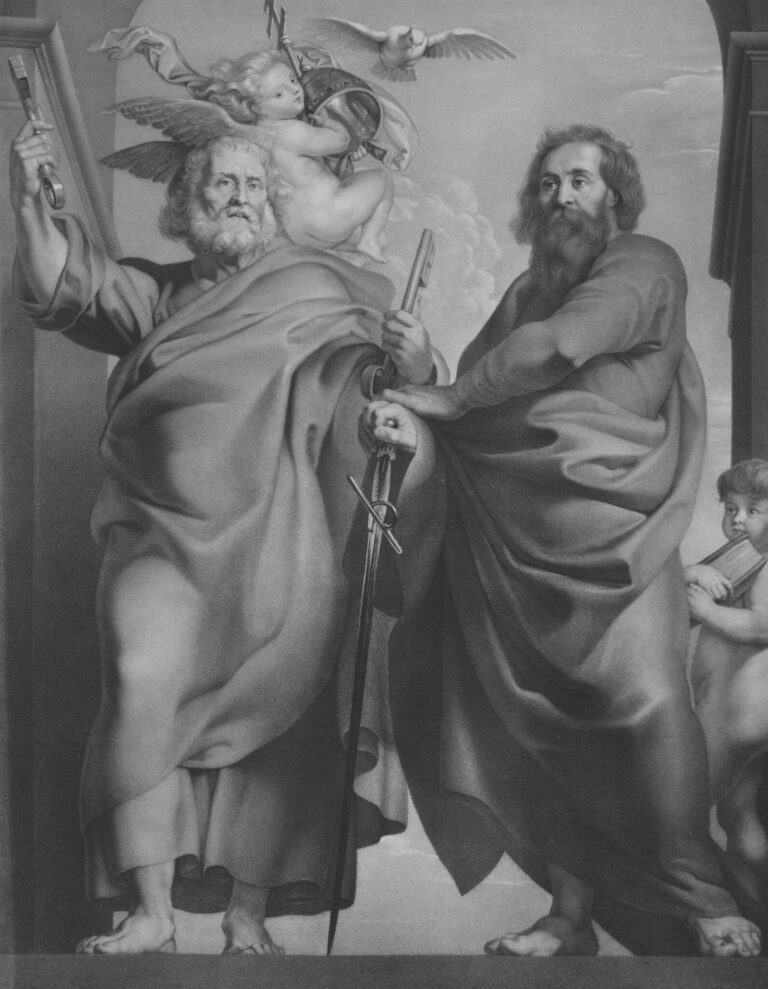The concept of the Trinity is central to Christian belief. The Trinity represents the Father, Son, and Holy Spirit as three distinct persons but one essence.
John 1:1-5 (KJV) provides a foundation for understanding this mystery: “In the beginning was the Word, and the Word was with God, and the Word was God. The same was in the beginning with God. All things were made by him; and without him was not any thing made that was made. In him was life; and the life was the light of men. And the light shineth in darkness; and the darkness comprehended it not.”
The Word as Jesus Christ
The “Word” mentioned in John 1:1 is Jesus Christ. This verse clearly states that Jesus, the Word, was both with God and was God. This duality affirms the deity of Christ. Jesus is not merely a prophet or a good man; He is God Himself. This is further supported in John 1:14 (KJV): “And the Word was made flesh, and dwelt among us, (and we beheld his glory, the glory as of the only begotten of the Father,) full of grace and truth.” This verse confirms that Jesus, God incarnate, lived among us.
The Father
God the Father is the first person of the Trinity. He is the creator and sustainer of all things. In Genesis 1:1 (KJV), we read, “In the beginning God created the heaven and the earth.” The Father’s role as creator is also echoed in John 1:3 (KJV): “All things were made by him; and without him was not any thing made that was made.” (notice the connection between this and with Jesus as the Word in the above paragraph). The Father’s authority and sovereignty are evident throughout the Bible.
The Holy Spirit
The Holy Spirit is the third person of the Trinity. He is often thought of as the power of God in action. In John 14:26 (KJV), Jesus says, “But the Comforter, which is the Holy Ghost, whom the Father will send in my name, he shall teach you all things, and bring all things to your remembrance, whatsoever I have said unto you.” The Holy Spirit is our helper, teacher, and guide. He dwells within believers, empowering them to live according to God’s will.
Unity and Distinction
The Trinity is unique in its unity and distinction. The Father, Son, and Holy Spirit are distinct persons, yet they are one God. This unity is seen in their perfect harmony and mutual indwelling. In John 10:30 (KJV), Jesus says, “I and my Father are one.” This oneness doesn’t negate their distinct roles but highlights their divine unity.
The Trinity in Creation
The involvement of the Trinity in creation is evident in the Scriptures. In Genesis 1:26 (KJV), God says, “Let us make man in our image, after our likeness.” The plural pronouns “us” and “our” suggest the presence of the Trinity. John 1:3 (KJV) affirms that all things were made by the Word, Jesus. The Spirit of God also plays a role in creation, as seen in Genesis 1:2 (KJV): “And the Spirit of God moved upon the face of the waters.”
The Trinity in Salvation
The work of salvation is a cooperative effort of the Trinity. The Father initiates salvation, the Son accomplishes it, and the Holy Spirit applies it. John 3:16 (KJV) shows the Father’s love in giving His Son: “For God so loved the world, that he gave his only begotten Son, that whosoever believeth in him should not perish, but have everlasting life.” Jesus, the Son, took on human flesh and died for our sins. The Holy Spirit convicts us of sin and regenerates our hearts, as seen in John 16:8 (KJV): “And when he is come, he will reprove the world of sin, and of righteousness, and of judgment.”
The Trinity in the Believer’s Life
Believers experience the Trinity in their daily lives. The Father’s love sustains us. The Son’s grace redeems us. The Holy Spirit’s presence empowers us. In Romans 8:14-17 (KJV), we see this relationship: “For as many as are led by the Spirit of God, they are the sons of God. For ye have not received the spirit of bondage again to fear; but ye have received the Spirit of adoption, whereby we cry, Abba, Father. The Spirit itself beareth witness with our spirit, that we are the children of God: And if children, then heirs; heirs of God, and joint-heirs with Christ; if so be that we suffer with him, that we may be also glorified together.”
Jesus’ Baptism
The baptism of Jesus provides a clear picture of the Trinity. In Matthew 3:16-17 (KJV), it is written: “And Jesus, when he was baptized, went up straightway out of the water: and, lo, the heavens were opened unto him, and he saw the Spirit of God descending like a dove, and lighting upon him: And lo a voice from heaven, saying, This is my beloved Son, in whom I am well pleased.” Here, Jesus is baptized, the Spirit descends, and the Father speaks from heaven, showing the three distinct persons of the Trinity.
The Great Commission
Jesus’ Great Commission also emphasizes the Trinity. In Matthew 28:19 (KJV), He instructs, “Go ye therefore, and teach all nations, baptizing them in the name of the Father, and of the Son, and of the Holy Ghost.” This directive highlights the importance of acknowledging the triune nature of God in the act of baptism.
The Role of the Holy Spirit
The Holy Spirit plays a vital role in the life of a believer. He convicts us of sin, guides us into truth, and empowers us for service. John 16:13 (KJV) says, “Howbeit when he, the Spirit of truth, is come, he will guide you into all truth: for he shall not speak of himself; but whatsoever he shall hear, that shall he speak: and he will shew you things to come.” The Spirit’s guidance is essential for understanding and living out the truths of the Gospel.
The Interdependence of the Trinity
The Trinity operates in perfect interdependence. The Father sends the Son (John 3:17 KJV). The Son sends the Spirit (John 15:26 KJV). The Spirit glorifies the Son and the Father (John 16:14-15 KJV). This interdependence reflects their unity and distinct roles.
Understanding the Trinity
The Trinity is a mystery beyond full human comprehension. However, it is essential to grasp its importance. Believing in the Trinity is foundational to Christian faith. It shapes our understanding of God’s nature, His work in creation, and His plan of salvation.
Living in Light of the Trinity
Living in light of the Trinity means recognizing and honoring each person of the Godhead. It involves worshiping the Father, trusting in the Son, and walking in the Spirit. It means embracing the fullness of God’s revelation and allowing it to transform our lives.
Wrapping Up
The Trinity—Father, Son, and Holy Spirit—is a core doctrine of Christianity. John 1:1-5 provides a great starting glimpse into this profound mystery. The Father’s love, the Son’s sacrifice, and the Spirit’s presence are integral to our faith and salvation.
Understanding and living in light of the Trinity enriches our relationship with God and deepens our spiritual walk.






